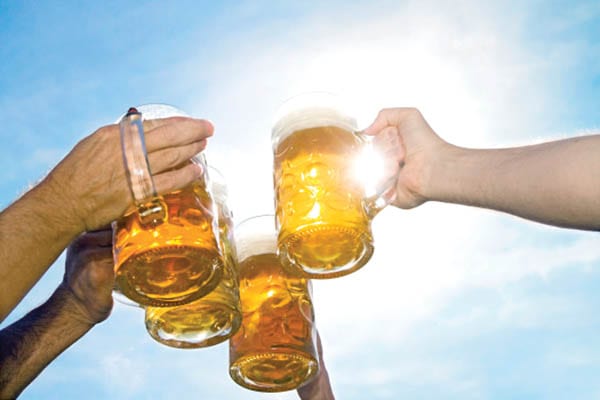by Kevin Bloom
Editor’s Note: The following article first appeared in the 3rd edition of The Free Stater magazine, which was distributed at Liberty Forum 2015. Kevin Bloom’s story exemplifies the old adage: “Where there is a will, there is a way.”
Because of the passing of the nanobrew bill, several Free Stater owned nanobreweries have sprung up, including Able Ebeneezer Brewing Company in Merrimack, Earth Eagle Brewing in Portsmouth, and soon Kevin’s own nanobrewery, Area 23 in Concord. If every mover came to New Hampshire with one idea of how to increase liberties and create more small businesses, we’ll achieve “Liberty in Our Lifetime,” in, well, no time. Cheers!
Manchester Brewing is Born
 In March of 2008, I sold a company I had started in Michigan to my partners. With the proceeds I planned on building a brewery. I’d heard about the Free State Project in 2007 during the Ron Paul campaign. I researched the laws regarding breweries in New Hampshire and thought I’d investigate more.
In March of 2008, I sold a company I had started in Michigan to my partners. With the proceeds I planned on building a brewery. I’d heard about the Free State Project in 2007 during the Ron Paul campaign. I researched the laws regarding breweries in New Hampshire and thought I’d investigate more.
I visited Manchester in April 2008. The day I arrived, it was sleeting. I stayed with some early movers at Porc Central for a couple of weeks, decided I disliked Manchester, and went home. The folks I met were an interesting bunch, but the city wasn’t Ann Arbor. After I’d been back in Michigan for a couple of weeks, I decided New Hampshire was worth another try. I returned in May, this time moving to Candia, a small town on the outskirts of Manchester. In June, I found a location for the new brewery and Manchester Brewing was born.
In September, the brewery got a federal brewer’s notice, and soon we were up and running. During the fall and winter, we increased the number of outlets until we had 39 stores. In the spring of 2009, we had to decide whether to buy a truck and expand our self-distribution, hiring a driver and full-time delivery crew, or sign up with a distributor. Cue fatal, foreshadowing music here.
Distribution Pains
We signed with a local distributor, aligned with Anheuser Busch. They agreed to buy 200 cases a week and claimed they could double that during the summer months. We borrowed money and bought a bottling machine, a labeling machine, and a new $9000 carbonation tank. That summer, rather than buying more beer, the distributor informed us they had enough supply and didn’t need more. Our customers were calling and telling us the stores were out of our beer, even though we knew the distributor had plenty. The store owners told us the distributor was claiming they were all out. We made arrangements to sell out of state, in Vermont and Massachusetts, but the damage was done. To make things worse, the distributor had not rotated our beer; they merely stocked new beer in front and sold that, and left early beer in a hot storeroom to go bad. Our beer went from a B+ average on Beer Advocate to a C. By the following year, because of the complexities of getting out of a distribution agreement without suing, Manchester Brewing was out of business.
Reform Attempts
In 2009, I was invited to an NHLA-sponsored “Meet the Candidates” event at The Draft, a sports bar in downtown Concord owned by a liberty-friendly senator, Andy Sanborn. One of the event’s organizers was Jim Forsythe, probably the most libertarian senator ever elected in New Hampshire. I talked to the candidates and realized they were just normal people, none of whom considered themselves special or entitled. In Michigan, I never would have met a group of candidates this large and accessible–you just don’t (and you probably don’t want to). I ended up campaigning for eight pro-freedom candidates, and they all won. 2010 was a real bumper crop, as it turns out.
When the window for new legislation opened, I was ready with a bill to reform the brewing industry. The proposed legislation would have ended the distributors’ monopoly and the stranglehold Anheuser Busch had on the state. It would lessen regulations for everyone, primarily benefiting small brewers. The bill would have eliminated restrictions on advertising, removed censorship on labels, removed limits on sales by the case, removed rules against selling beer over the counter, and lowered the licensing fees for breweries large and small. The bill was co-sponsored by early FSP movers and NH state representatives, Mark Warden and Cal Pratt.
After the bill proceeded through the Office of Legislative Services, where attorneys review bills, we were contacted by the Liquor Commission. They offered to support the bill if it was severely curtailed. Silly us, we agreed–and then they opposed it anyway. The resulting bill cut the license fees, and allowed breweries to sell their beer over the counter without having a restaurant. It also eliminated the “one case per person per day” restriction on sales from the brewery, and established “Nano brewery” as a separate class of brewery, where before there were only “Brewpubs” and “Beverage Manufacturers.”
I went to all the hearings with NH state representative Mark Warden, including the Commerce and subcommittee hearings. We learned that the Liquor Commission, the distributors, and Anheuser Busch worked hand-in-hand to quash the bill. We also learned three things the Establishment always says when confronted with a bill they don’t like:
- We’ve always done things this way, so why change now?
- Your way will cost too much.
- Think of the children (sometimes the elderly or other special interest groups are substituted here).
Logic does not enter the equation. Most of the time, the members will already be predisposed to either vote your way or not, and if you have friends on the committee, this can make a significant difference. Once the committee has your bill, they will modify it, sometimes changing the meaning around completely, so we were lucky that most of it survived.
Pint Glass Half Empty
Unbeknownst to us, the Anheuser Busch lobbyist had managed to insert a four ounces limit on the amount a brewery could serve over the counter. Have you ever ordered half a glass of beer? Of course not. House Bill 262, with the four ounce limit, went to the full House and passed on a voice vote, which is where the Speaker says, “All in favor say, ‘Aye’” and “All opposed, ‘Nay.’” The “Ayes” had it.
We attempted to fix the bill in the Senate, and introduced an amendment to lift the four ounce restriction. The Senate did not consider the amendment (nor do they have to), and the bill was passed as written. On June 6, 2011, Governor Lynch signed the bill into law, effective July 1, making New Hampshire the first state to establish nano breweries as a separate category of breweries. A nano brewery is limited to producing 2000 barrels of beer a year. Why 2000? Nobody knows. It’s a nice round number, though.
Pint Glass Half Full
In the year after the bill passed, more breweries opened in New Hampshire than have opened in any other time in the state’s history, including right after Prohibition ended.
In 2012, we came back with all the parts we had originally left out to please the Liquor Commission. We removed the prohibition on brewery advertising, with the exception of publications targeting minors. The prohibition had applied to any civic, educational, political, recreational, or religious publication—and it only targeted beer. We changed the regulation that required New Hampshire breweries to submit their labels to the federal TTB/ATF when the beer is only sold in-state.
We failed to get the four ounce limit removed, and eliminating the distributors’ monopoly was sent to a study committee, as was a bill to eliminate restrictions on cross-licensing. Cross-licensing forbids small breweries from forming a co-op to distribute their beer, or even from hiring one guy with a truck to drop off all their beer at the stores. Surprisingly, the study committee voted in favor of all of the above, to be acted on the next year.
Fermenting a Nano-Brewvolution
In the 2012 elections, the Republicans lost the House, and the Commerce committee was now chaired by a Democrat, Ed Butler. Since beer is non-partisan, we went right back in. This time, FSP early mover Tim O’Flaherty sponsored the bill, and movers Michael Garcia and Mark Warden co-sponsored it. Despite determined opposition from the distributors, Anheuser Busch, and the Liquor Commission, the four ounce rule was eliminated. The bill passed committee 15-1 and then the full House by a wide margin on a voice vote. However, once the bill got to the Senate, an amendment was attached mandating that all nano breweries have to have a restaurant. (See Establishment Reason #1 above.)
Along the way, we also helped legalize home winemaking. House Bill 253 created a second generation of nano breweries. This license costs an extra $240, but we can finally sell full pints! Governor Hassan signed the bill on July 24, 2013, effective that September. Since then, New Hampshire has seen an explosion of nano breweries, with more on the way.
My beer-to-beer story is only one example of what dedicated pro-liberty activists can accomplish in New Hampshire. To paraphrase Martin Mull–“You can’t keep a good beer (or man) down!”
Kevin Bloom is currently the Political Director of the New Hampshire Liberty Alliance and the Head Brewmaster at Area 23, a startup nano-brewery in Concord. His current projects include legislation legalizing poker and industrial hemp and banning civil asset forfeiture.
Reporting by the FSP on participant activity does not represent support or endorsement and may not portray the diversity of opinions and activities that exists among participants.

